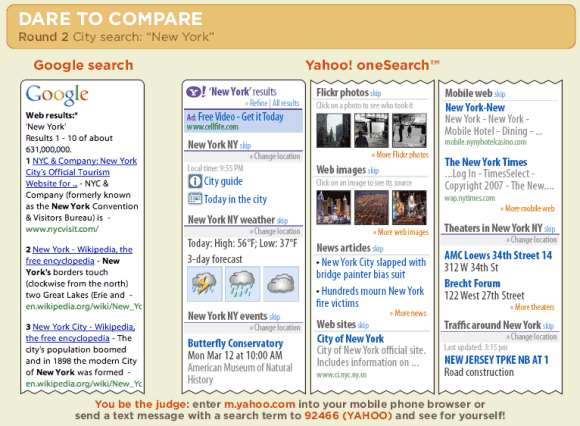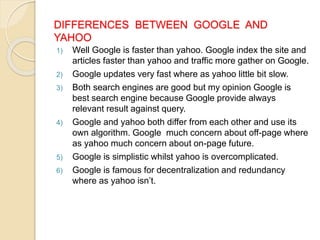Core Algorithm Differences
| Feature | Google Search Algorithm | Yahoo Search Algorithm |
|---|---|---|
| Primary Focus | Relevance, user experience, intent matching, and quality | Keyword relevance, content, news, and user engagement |
| Algorithm Complexity | Highly sophisticated, with frequent updates and machine learning integration | Less complex, less frequently updated, more straightforward |
| Keyword Strategy | Considers synonyms, context, and semantic meaning; less reliant on exact keyword density | Emphasizes exact keyword matches, keyword placement, and straightforward keyword density |
| Backlinks | Prioritizes quality and authority of backlinks (PageRank) | Considers backlinks, but also values domain age and authority |
| Localization | Advanced local search with Google Maps integration | Localized results, but powered by Bing’s data |
| Content Freshness | Prioritizes up-to-date, fresh content | May favor older, established sites with factual information |
| User Signals | Heavily weights user behavior (clicks, dwell time, etc.) | Considers user engagement, but to a lesser extent |
| Technical SEO | Strong emphasis on site speed, mobile-friendliness, Core Web Vitals | Less emphasis on advanced technical factors |
Keyword Strategy Implications
- Semantic Search: Google’s algorithm understands user intent and context, so exact keyword matching is less critical than providing comprehensive, high-quality content that answers the query.
- Synonyms and Related Terms: Google recognizes synonyms and related phrases, allowing for more natural language optimization.
- Content Quality: Fresh, authoritative, and well-structured content ranks higher, especially when it demonstrates expertise, authoritativeness, and trustworthiness (E-A-T).
- Technical Optimization: Fast-loading, mobile-friendly sites with good user experience are favored.
Yahoo
- Keyword Density: Yahoo’s algorithm places more weight on exact keyword matches and keyword density within content.
- Simplicity: Optimization is more straightforward—focus on clear keyword placement in titles, headings, and content.
- Domain Age and Authority: Older domains with established authority may have an advantage, especially for informational queries.
- Local and News Focus: Yahoo emphasizes local results and trending news, so content aligned with these areas may perform better.
- Technical SEO: While still important, advanced technical factors (like Core Web Vitals) are less emphasized compared to Google.
Practical SEO Considerations
- For Google: Invest in high-quality, semantically rich content, technical SEO, and a strong backlink profile. Avoid keyword stuffing; focus on user intent and experience.
- For Yahoo: Ensure clear keyword placement, maintain domain authority, and consider the value of older, factual content. Since Yahoo’s search is powered by Bing, optimizing for Bing’s algorithm will also benefit Yahoo rankings.
- Dual Optimization: While Google dominates market share, optimizing for Yahoo (and Bing) can capture additional traffic, especially in niches where these engines are more popular.
Summary
Google’s algorithm is more advanced, context-aware, and user-focused, requiring a holistic SEO approach that goes beyond keywords. Yahoo’s algorithm is simpler, more keyword-centric, and values domain authority and age, making optimization more straightforward but potentially less nuanced. Businesses should tailor their keyword and content strategies accordingly, depending on their target audience and which search engines they prioritize.





